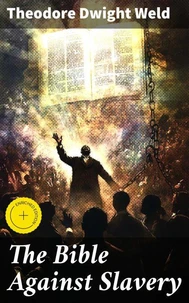The Bible Against Slavery
Par :Formats :
Disponible dans votre compte client Decitre ou Furet du Nord dès validation de votre commande. Le format ePub est :
- Compatible avec une lecture sur My Vivlio (smartphone, tablette, ordinateur)
- Compatible avec une lecture sur liseuses Vivlio
- Pour les liseuses autres que Vivlio, vous devez utiliser le logiciel Adobe Digital Edition. Non compatible avec la lecture sur les liseuses Kindle, Remarkable et Sony
 , qui est-ce ?
, qui est-ce ?Notre partenaire de plateforme de lecture numérique où vous retrouverez l'ensemble de vos ebooks gratuitement
Pour en savoir plus sur nos ebooks, consultez notre aide en ligne ici
- Nombre de pages85
- FormatePub
- ISBN859-65--4740214-5
- EAN8596547402145
- Date de parution13/11/2022
- Protection num.Digital Watermarking
- Taille323 Ko
- Infos supplémentairesepub
- ÉditeurDIGICAT
Résumé
In "The Bible Against Slavery, " Theodore Dwight Weld presents a spirited and erudite examination of the biblical texts as they relate to the institution of slavery. Weld's literary style is characterized by a compelling argumentative approach that intertwines meticulous exegesis with impassioned rhetoric. He systematically dissects the prevailing pro-slavery interpretations of scripture, arguing instead for a moral reading aligned with abolitionist ideals.
This 19th-century work emerged in the context of the burgeoning abolitionist movement, vigorously challenging the entrenched societal norms that justified slavery through religious doctrine. Theodore Dwight Weld was deeply influenced by the socio-political climate of antebellum America, particularly his Quaker upbringing, which instilled in him a profound commitment to social justice. His engagement with prominent abolitionists and his experiences as a lecturer in anti-slavery forums significantly shaped his perspective.
Weld's rigorous research and conviction were not only personal but rooted in a broader philosophical and ethical stance against oppression and inequality. "The Bible Against Slavery" is a crucial text for anyone seeking to understand the intertwining of religion and morality in the fight against slavery. Weld's bold arguments and thoughtful analysis make it an indispensable resource for scholars, students, and activists dedicated to the ongoing struggle for justice and equality.
This 19th-century work emerged in the context of the burgeoning abolitionist movement, vigorously challenging the entrenched societal norms that justified slavery through religious doctrine. Theodore Dwight Weld was deeply influenced by the socio-political climate of antebellum America, particularly his Quaker upbringing, which instilled in him a profound commitment to social justice. His engagement with prominent abolitionists and his experiences as a lecturer in anti-slavery forums significantly shaped his perspective.
Weld's rigorous research and conviction were not only personal but rooted in a broader philosophical and ethical stance against oppression and inequality. "The Bible Against Slavery" is a crucial text for anyone seeking to understand the intertwining of religion and morality in the fight against slavery. Weld's bold arguments and thoughtful analysis make it an indispensable resource for scholars, students, and activists dedicated to the ongoing struggle for justice and equality.
In "The Bible Against Slavery, " Theodore Dwight Weld presents a spirited and erudite examination of the biblical texts as they relate to the institution of slavery. Weld's literary style is characterized by a compelling argumentative approach that intertwines meticulous exegesis with impassioned rhetoric. He systematically dissects the prevailing pro-slavery interpretations of scripture, arguing instead for a moral reading aligned with abolitionist ideals.
This 19th-century work emerged in the context of the burgeoning abolitionist movement, vigorously challenging the entrenched societal norms that justified slavery through religious doctrine. Theodore Dwight Weld was deeply influenced by the socio-political climate of antebellum America, particularly his Quaker upbringing, which instilled in him a profound commitment to social justice. His engagement with prominent abolitionists and his experiences as a lecturer in anti-slavery forums significantly shaped his perspective.
Weld's rigorous research and conviction were not only personal but rooted in a broader philosophical and ethical stance against oppression and inequality. "The Bible Against Slavery" is a crucial text for anyone seeking to understand the intertwining of religion and morality in the fight against slavery. Weld's bold arguments and thoughtful analysis make it an indispensable resource for scholars, students, and activists dedicated to the ongoing struggle for justice and equality.
This 19th-century work emerged in the context of the burgeoning abolitionist movement, vigorously challenging the entrenched societal norms that justified slavery through religious doctrine. Theodore Dwight Weld was deeply influenced by the socio-political climate of antebellum America, particularly his Quaker upbringing, which instilled in him a profound commitment to social justice. His engagement with prominent abolitionists and his experiences as a lecturer in anti-slavery forums significantly shaped his perspective.
Weld's rigorous research and conviction were not only personal but rooted in a broader philosophical and ethical stance against oppression and inequality. "The Bible Against Slavery" is a crucial text for anyone seeking to understand the intertwining of religion and morality in the fight against slavery. Weld's bold arguments and thoughtful analysis make it an indispensable resource for scholars, students, and activists dedicated to the ongoing struggle for justice and equality.



